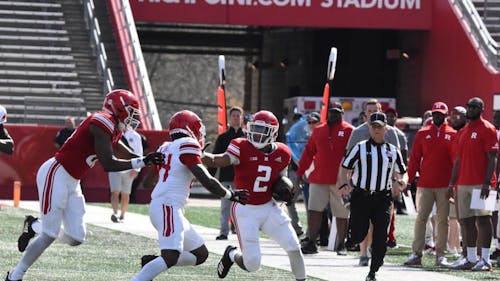Can running backs group carry Rutgers offense in 2019?

In 2018, the Rutgers football team’s offense suffered from excess turnovers and a lack of passing production. A true freshman quarterback and inconsistent options at wide-out anchored the inefficiency, but there was gleaming contributions by the running back core.
The Scarlet Knights' three most efficient pieces on last season’s offense were all found in the backfield with running backs sophomore Raheem Blackshear, true freshman Isaih Pacheco and graduate student Jonathan Hilliman leading the unit in receiving yards and total yards from scrimmage.
For rising sophomore quarterback Artur Sitkowski, he could look to lean on these options in the backfield if wide-out play doesn’t improve from last season. Sitkowski’s receiving core from 2018 did not have a receiver cross either the 300-receiving yard mark or the three-touchdown mark, but Blackshear and Pacheco combined for more than 1,500 yards from scrimmage and eight touchdowns.
“They do all have different skill sets and I think we’re gonna be able to do different things with those guys,” said head coach Chris Ash. “A couple of them are tailbacks, a couple of them are multi-purpose backs … it’s a good problem to have. They’re weapons we can use to be more productive and get the ball out.”
Blackshear
After last season’s Week One win over Texas State, offensive coordinator John McNulty made the statement that Blackshear was the team’s best player on offense, and his season totals all but vindicated McNulty's compliments.
Much of Blackshear’s prominence on the offense was emphasized by ineptitude at other positions, but for a young running back playing in the Big Ten, Blackshear put together a productive season by any standards.
Blackshear finished the year as the team’s leading rusher and receiver, and just 43 yards short of a 1,000-yard season. His skill set makes him a dual threat for Rutgers offense, with a specialty for catching the ball out of the backfield.
He does lack the power to be the big bruiser in heavy sets and Iso, leaving that role in the hands of other pieces on the roster.
Blackshear also brings a critical presence to the locker room, as the rising junior will take on the role of captain.
Pacheco
Pacheco’s role as a more traditional rusher limited his frequency for catching out of the backfield. As the team’s second leading rusher, Pacheco showed a knack for breaking off big long rushing plays in between and outside the tackles.
He is currently the record holder for the longest rushing play in program history with an 80-yard touchdown last season against Michigan State.
Ironically, his biggest contributions to the passing game have actually come as the passer on a series of trick plays. This extra utility makes his presence on that gives the offense one more dimension, even if only on trick plays.
Snorweah
Junior running back Charles Snorweah flashed at the spring game with a game-leading 167 rushing yards. With the departure of Hilliman, 2018’s leading touchdown scorer and go-to-back on short yardage situations, Snorweah may emerge as the top option on power rushing downs.
Newcomers
This running back core will be supplemented this season by incoming freshman running backs Aaron Young and Kay’Ron Adams who will compete for touches in the backfield.
McNulty’s offense will need improvement by more position groups than just the running backs to be competitive in 2019, but the Knights have a history of successfully leaning on a group of running backs with versatile skill sets.
In 2006, it was Ray Rice and Brian Leonard leading the way on offense with Rice playing the role of the featured power rusher, and Leonard complimenting as pass catcher out of the backfield.
More recently in 2014 it was Desmon Peoples and Robert Martin racking up the bulk of the yardage both on the ground and through the air to lead the program to its most recent bowl-winning season.
Blackshear, Pacheco and company will look to make a similar impact in 2019 for an offense looking for improvement in every phase.
“Bringing that versatility opens up our playbook so much,” Sitkowski said. “For me it makes it easier to just dish it out to guys and play smart football."



